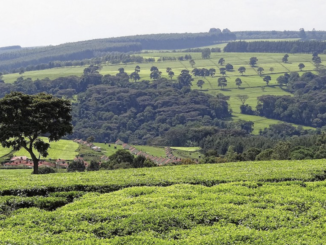
Senate of Kenya Plenary Chamber,
Senate of Kenya – Licence CC BY-SA 4.0
For Kenya’s Western-controlled political stomachs, with the expected support of Kenya’s Lame Stream, the same agenda continues. Post Ruto’s signing off (or in his case, thumbprint of the Finance Act 2023) under direction of US State Dept going against everything he, “Campaigned in the margins for to support the poor/unwaged” got the expected result – legally sanctioned protests.
The iconic Saba Saba Day (July 7th 1990 demonstrations for a democratic political system) marked upping the ante of protests, and occurred throughout July. The GINO, in true style, set the armed police on demonstrators, killing at least officially 79 protestors. Nothing of course was mentioned in lame stream over the fact the police hadn’t been paid for two months, so the protestors and general wananchi (people) were deemed fair targets for the police, whether involved in protests or not.
Given the past elections since the removal of Moi in 2002, (elections of 2002, 2007, 2013, 2017 and 2022) have all followed the same colonial-controlled pattern. Kibaki brought an end to decades of one-party rule when he was elected president in 2002, but his promises to end government corruption were undermined by accusations of graft and by violence surrounding his re-election bid. Regardless, and conveniently, the UK GINO (under the control of the Former Colonial Office) ensured everything that followed was managed under the tribal banner, with US State Dept “supporting controlled opposition.” For ease of historical reference:
1963 Independence Jomo Kenyatta Kikuyu
1978-2002 Daniel Arap Moi Kalenjin (appointed being Kenyatta’s No. 2)
2002 Mwai Kibaki Kikuyu
2007 Mwai Kibaki Kikuyu
2013 Uhuru Kenyatta Kikuyu
2017 Uhuru Kenyatta Kikuyu
2022 William Ruto Kalenjin
After a failed attempt in 2005 to railroad in a new constitution, in 2010, Kenya again “re-wrote its constitution”, which, in simple terms was a copy/paste of the US Constitution (which Kenyans rejected and ignored in 2005), which saw the US political strands implanted into the Kenya system. This tsunamied the old political posts within the system that was continued from the colonial era. Previously there was president, ministers, MPs, local administrators. The 2010 constitution saw the arrival of more fake positions across Kenya which brought in governors, senators, at local level aside MPs, Members of County Assembly (MCA) who were supposed to replace colonial administrative positions of the county governments and play a role in legislation, representation, and oversight – which of course never happened.
The changes included: changing the structure of the state from a federal, or Majimbo system, to a unitary system; creation of a unicameral instead of bicameral legislature; changing from a parliamentary to a semi-presidential system with a powerful presidency; and reducing the protections of the Bill of Rights. Further amendments to the 1969 constitution were later effected, including, in 1982, the institution of a de jure single-party government. This is key as it gave permanent control to Moi.
In view of the rejection by the people of the Wako Bill in the referendum held on 21 November 2005, the subsequent dissolution of the Cabinet and the prorogation of Parliament, as well as the formation of a new Cabinet, it was shelved as the 2007 election campaigning began in January 2006.
Post the contentious 2007 election and subsequent fighting that ensued, resulting in the position of PM created for controlled opposition leader Odinga, the 2010 Constitution was fast tracked under the radar, with more behind the scenes attention paid (by the Western controllers) to the narrative. Voters were asked whether they would APPROVE a new constitution on 4th August which again the House of Saville reported. The majority of Kenyans approved bringing in a new constitution, among those who voted against it being Ruto (and Moi). The new constitution came into force with outgoing President Kibaki ratifying it. Again the House of Saville were present to “report” citing international heavy hitter supporters attending; Omar Bashir from Sudan and the stellar EU Foreign Policy Chief Catherine Ashton.
Enter the WEF anacronyms
Following the 2017 presidential election (initially ruled illegal by the Supreme Court under US funding and control), forced President-elect Kenyatta into a re-run), the two leading contenders – Kenyatta (who won both original and re-run election) and Raila Odinga – proposed a “Building Bridges Initiative” (BBI), which consisted of a number of proposed amendments to Kenya’s constitution.
Promoted by Kenyatta and Odinga as a way to resolve factional tensions in the nation – improving inclusion and ending Kenya’s winner-take-all elections – the amendments sought to:
- Expand the executive and legislative branches;
- Add the post of prime minister;
- Add two deputies
- Add official leader of the opposition
- Revert to selecting cabinet ministers from among the elected members of parliament,
- Create at least 70 new constituencies; and
- Add an affirmative action clause that would create the possibility of up to 300 unelected new members of parliament – potentially creating a parliament nearing the size of the United States Congress.
Critics (the wananchi) stated the effort was unnecessary, was a selfish attempt to reward political dynasties, which would produce an oversized government that debt-laden Kenya could not afford.
Kenyatta created a BBI constitutional committee to present the BBI as a popular initiative, allegedly started by ordinary citizens, as allowed by the Kenyan constitution. A BBI task force gathered five million signatures in support of the proposal.
The BBI was reportedly (by Kenya lame stream) a matter of great political importance to both Kenyatta (who was due to leave office shortly thereafter) and Odinga (who was expected to run for the presidency), and reportedly bribes of up to $1,000 (£700) were given to some members of parliament to secure support for the BBI. The issue dominated Kenyan politics from 2019 to 2021. What wasn’t reported was the behind-the-scenes efforts by both US and UK to get BBI into law.
The BBI was passed by (US/UK controlled) Kenya’s National Assembly and Senate, and was awaiting President Kenyatta’s approval when it was challenged in the Kenyan High Court.
High Court rejection
In May, 2021, the Kenyan High Court blocked the BBI plan, declaring it irregular, illegal and unconstitutional.
The court ruled that the Kenyatta was not eligible to undertake such an amendment process because he was not simply an ordinary citizen – the only people authorized by the constitution to undertake such an effort.
The court further chastised President Kenyatta, saying that his BBI constitutional committee was illegal, and the five million signatures it gathered were not proof that it was a true citizen-led initiative, saying:
“A popular initiative to amend the constitution can only be started by the people not by the government”
The court added that the president had failed to pass the leadership and integrity test – warning (for lame stream consumption) that he could be sued, personally, for his actions. The court’s ruling established grounds for impeachment of the president – though the parliament, which passed the bill, was reported unlikely to challenge Kenyatta. Puffins will have to be seated, as even the House of Saville accurately, for once reported this.
With this initial WEF failure, the next off-the-ramp in Kenya was Convid. Rejected outright at inception by Kenyans, Uhuru, following FCO orders, approved a number of measures that also significantly curtailed constitutionally guaranteed rights.
A national curfew was imposed between 7:00 pm and 5:00 am for a 30-day period on 27th March 2020, extended for 21 days on 25th April and further extended to 6th June 2020. Uhuru further added the banning of travel in and out of Nairobi, Mombasa, Kwale and Kilifi counties. Curfews were brutally enforced by the police with six deaths reported on the first night of the curfew. Despite stipulating penalties for its contravention, on 19th April, the state announced that persons found to breach curfew rules shall be assumed to have come into contact with the virus and shall be mandatorily quarantined. Following public outrage nationally, the state announced that it would establish “curfew breakers’ holding places.” These actions were deemed by the High Court an unlawful limitation of the rights of an accused person to be arraigned before a court.
Health Cabinet Secretary Mutahi Kagwe, whose appointment on 28th February coincided with the announcement of a “pandemic outbreak”, was daily on lame stream, pleading with Kenyans to obey government directives or brace themselves for tough times ahead. In true Kenya form in spotting an empty vessel, despite Kagwe’s warnings, often punctuated with threats, he didn’t fail to notice but could do nothing about the defiance Kenyans, in ignoring guidelines issued by his ministry demonstrated.
His famous statements, live on Kenya evening news that defiant Kenyans are complicating the war on the pandemic and promised that the law will catch up with them.
“For those who are disobeying orders and even holding house parties, we shall catch up with you and ensure you face the law.”
He imploded further without realising he looked stupid by further adding,
“Yesterday, Nairobi youth hired an ambulance to take them and their alcohol to a party in Nairobi, return them home and no one reported them.”
Not to be outdone, the House of Saville rolled out its fear propaganda (and failed) including one mother of an MP who’d become ill (natural causes), died shortly afterwards, only to be told during funeral preparations she’d just tested positive for Convid and under “emergency laws” had to be immediately buried.
Generally, from personal experience, no one wore masks, gloves, ignored curfews, went to bars and conducted their daily business as usual. Even the local police ignored it, although they did officially claim they were out on night patrols enforcing the rules. The reality I can confirm, the local police sat in the station and syphoned the fuel off to sell or for personal use.
As usual, entering election year (2022), Convid rhetoric was quietly shelved aside one GINO statement that, “Malaria, typhoid and road accidents killed more Kenyans in 2022 than Convid did.”
The detail surrounding last year’s false, rigged election, covered in previous posts is self-explanatory. The geopolitical shift of control was the US deciding, having funded Ruto, to take over from the FCO (or FCDO as it’s now known). What local lame stream don’t or won’t air is the US is now out of its depth trying to control its proxy. The UK model of having preferred (i.e. funded) proxies always came with controlled opposition (Odinga) – the divide-and-rule agenda. Currently, with proposed talks, that’ll fail, the next step will be essentially Ruto (Kalenjin) running a one-party state as was under Moi (Kalenjin) and further attempts at WEF anagrams to be attempted. This is the core area Kenyans old enough to remember have no desire of returning to. On top of that, the younger, educated generation have reached the point none of this old style, tribal politics has ever worked and reject it outright.
One final point from my local area, regarding our “elected” MCA (Member of County Assembly) Evanson Muigu (Ruto’s party), was obviously sworn in last year. Immediately from his swearing-in, he went to the bank (Stanbic), taking out his interest-free loan (at 0%) and started building his house (½ mile up the road from me). As of the date of this article, he hasn’t received 1 Kenya Shilling in salary and last Friday (11th August) the bank repossessed his land.
The parallels between, and Western rules-based order agendas in Kenya and UK are a lot closer than is reported. More so, given the West is running out of controlled proxies in Africa where they can maintain their leverage. US proxy Ruto being no exception. It’s taken as a given the UK, while managing their controlled opposition proxy (with enough funds), will play their usual gambit of sitting on the fence if, or when, it goes pear-shaped again.
Welcome to Kenya.
© AW Kamau 2023



